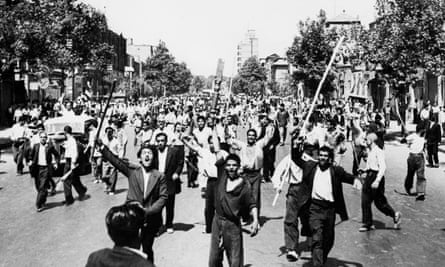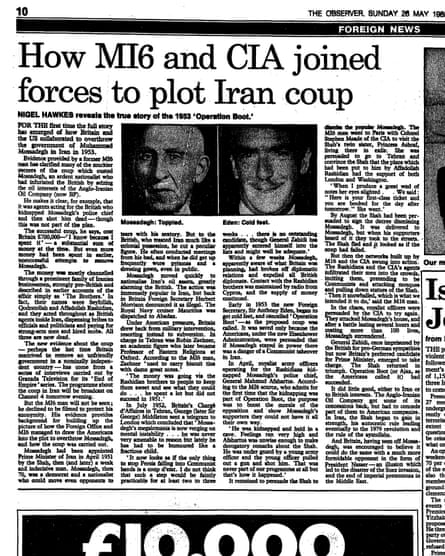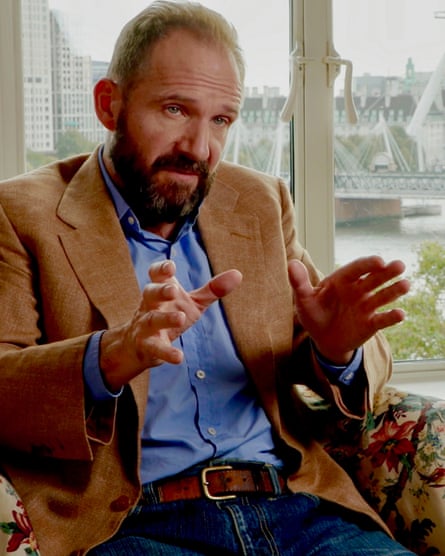MI6, the coup in Iran that changed the Middle East, and the cover-up
 Protesters in Tehran during the 1953 coup. Photograph: AFP
Protesters in Tehran during the 1953 coup. Photograph: AFP
T
The report, headlined “How MI6 and CIA joined forces to plot Iran coup”, appeared in the 26 May edition but was swiftly quashed. It exposed the fact that an MI6 man, Norman Darbyshire, had run a covert and violent operation to reinstate the Shah of Iran as ruler of the country in 1953. Yet just a few days after the newspaper came out, all fresh evidence of this British operation and of Darbyshire’s identity disappeared from public debate.
“We still do not know who leaked this to the Observer originally, or why,” said film-maker Taghi Amirani this weekend, ahead of the release of his documentary, Coup 53. “We only know that any record of the interview with Darbyshire quickly disappeared and no one followed up the story. It smacks of a complete cover-up of British involvement to this day.”
The background to the 1953 coup d’etat has long been the cause of international suspicion and conjecture. Prime Minister Winston Churchill opposed the rule of the country’s first democratic leader, Mohammad Mossadegh, largely because it threatened Britain’s interests in Iran’s oil industry. Working with the CIA, who also hoped to see the Shah Reza Pahlavi back on the throne, it is now clear that MI6 did much more than agitate for Mossadegh to be overthrown.
In June, documents found in a Washington archive showed how Queen Elizabeth II’s name was mistakenly used to persuade the Shah to stay in Iran prior to the coup. Coup 53 now makes a clear case that the British were orchestrating an uprising, going as far as kidnapping, torturing and paying for protesters to go out on to the streets of Tehran.
Coup 53, released on 19 August, the 67th anniversary of the coup, follows the investigations of Anglo-Iranian director Amirani. Working with Walter Murch, the acclaimed editor of films such as The Conversation, Apocalypse Now and The English Patient, Amirani delves into the archives and interviews many of those involved.

“We knew nothing of the Darbyshire mystery, or of the mystery about that mystery, when we started making this film,” said Murch. “None of this was on our radar. Taghi discovered things as we went along. The thriller element was not part of our template, which was to look back at unseen interviews. This was the most material I have ever had to work with – 532 hours – more than double what I handled on Apocalypse Now.”
The turning point was when Amirani found key evidence in abandoned research carried out for a landmark Granada documentary series of the mid-1980s, End of Empire. A transcript of an episode about Iran originally contained an interview with Darbyshire, who spoke candidly.
“My brief was very simple,” says Darbyshire. “Go out there, don’t inform the ambassador, and use the intelligence service for any money you might need to secure the overthrow of Mossadegh by legal or quasi-legal means.” The MI6 officer goes on to explain he spent “vast sums of money, well over a million-and-a-half pounds”, adding, “I was personally giving orders and directing the street uprising.”
Yet the explosive interview footage was never broadcast. In Amirani’s film, the part of Darbyshire is played by Ralph Fiennes, who delivers lines from the censored Granada transcript. The 1985 Observer article by reporter Nigel Hawkes was published just before the Iranian episode was shown by Channel 4.

But when the programme went out, Darbyshire and his testimony were absent. A TV review a week later by Observer critic Julian Barnes made no mention of this part of the story. Amirani, Murch and the intelligence experts they have consulted now conclude the government stepped in after a private screening, preventing the producers from using the Darbyshire interview. Newspapers, including the Observer, edited at the time by Donald Trelford, would also have been told to go no further with the story, using a state provision known as a D Notice.
Darbyshire worked closely with a CIA counterpart, Stephen Meade, who did appear in End of Empire. He describes his British colleague as “a very competent individual who spoke Farsi fluently as well as French”.
Perhaps the most shocking evidence in Coup 53 concerns British guilt in the kidnapping and eventual “accidental” killing of the Iranian police chief Mahmoud Afshartous. This incident deliberately provoked the unrest that led to the arrest and imprisonment of Mossadegh in August.
In the lost footage, Darbyshire claims he made “the correct psychological reading of the Persian mob character”, but that he understood that they “had the feeling they were being screwed, and rightly so, from 1920 onwards”.
Darbyshire died in 1993, and former Granada researcher Alison Rooper, who worked on End of Empire, together with her producer/director Mark Anderson, tell Amirani they have no clear memory of interviewing the MI6 officer or of what happened to the footage.
The shah, who had been living in exile in Italy, flew back to Iran, then governed by CIA- and MI6-approved General Fazlollah Zahedi. In America, the coup was known as Operation Ajax, while in Britain it was Operation Boots. The shah ruled the country until the Islamic revolution of 1979.
“This coup shaped not only western relations with Iran for 60 years, but changed the Middle East. Imagine if there had been a democracy there,” said Amirani.
Geen opmerkingen:
Een reactie posten
Opmerking: Alleen leden van deze blog kunnen een reactie posten.